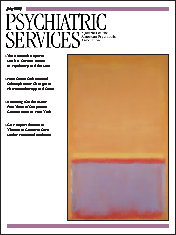In general, the clinical neurophysiology needs of psychiatry departments are currently provided by clinical neurophysiology laboratories housed in neurology departments for electroencephalography (EEG), medicine for electrocardiography (ECG), and either medicine or neurology for sleep studies. This arrangement has a number of significant drawbacks. First, a majority of studies of the use of EEG among patients with psychiatric disorders are published in psychiatry or psychophysiology journals, which are not commonly read by internists or neurologists. Second, most neurologists and internists lack psychiatric training. This training gap is a serious problem, because interpretation of tests must be performed within the differential diagnostic process for the patient.
Psychiatry-based clinical neurophysiology laboratories could remedy both these problems. Moreover, the proximity of the laboratory to the clinical population will allow psychiatry trainees and faculty members to be more exposed to this area of knowledge. Such exposure is important, because the current underutilization of EEG by psychiatrists is largely a result of the psychiatrists' distance from the field and consequent poor understanding of psychiatric indications for EEG assessment. The value of EEG in the diagnostic evaluation of psychiatric patients is well documented (
1). Polysomnography has a limited but definite place in the work up of nocturnal episodes. Finally, the use of EEG in psychiatry has recently increased as a result of the adverse effects of a number of new psychotropic agents.
In this report we describe the experience at the department of psychiatry at the Ludwig-Maximilians-University of Munich, Germany, where clinical neurophysiology services are provided within the department.
The division of clinical neurophysiology provides all clinical EEG and ECG studies for inpatients and outpatients in all age groups. Patients receive a routine EEG recording, usually within the first week after admission, before they receive medication. Further recordings for monitoring are performed on request, if clinically necessary. In cases of suspected epilepsy or epileptic seizures, serial EEGs are recorded. All ECG recordings are also provided by this unit.
The clinical neurophysiology laboratory is an autonomous working group managed by physicians who are trained in psychiatry, neurology, and neurophysiology. These physicians are responsible for the supervision and training of staff, quality assurance of the technical devices, analyses of neurophysiologic data, preparation of the written EEG reports, and contact and cooperation with clinicians.
Personnel training includes continuing clinical education—for example, psychopathology and differential diagnoses of neuropsychiatric disorders, technical practice and tutorials, and discussion of important EEG findings and specific EEG patterns.
After the routine admission workup, further assessments are performed as needed. It has been estimated that, on average, more than 3,000 routine and research EEGs and more than 4,000 routine ECGs are recorded in the laboratory each year.
Because the unit is integrated within the psychiatric hospital, there is a close cooperation between neurophysiologists and clinicians. The neurophysiologic assessments are requested by using a standardized form and are usually handled within three days in cases of emergency (delirium, confusional states, and suspected nonconvulsive epileptic states) without any delay. On the same day of the respective recordings, the data are analyzed, and a report is sent back to the ward. There are weekly demonstrations of EEG recordings with relevant findings for all clinicians.
The average cost of a routine EEG as covered by health insurance ranges between $30 and $80, depending on the complexity of the case. However, up until now the diagnostic and therapeutic procedures have been part of the daily fixed costs of a hospital stay. The routine EEG and ECG recordings are included in the general diagnostic services and are covered by the hospital budget (included in the total cost of stay in hospital).
This model of a psychiatry-based clinical neurophysiology laboratory exemplifies the many benefits such a service can provide for the discipline of psychiatry. The laboratory provides a teaching service that is currently lacking from a majority of psychiatry training programs. The laboratory also provides an opportunity to conduct clinical studies or derive publishable data from ongoing service records—for example, pharmacoelectroencephalographic studies.
Regarding cost, an important point to be emphasized is the significantly lower charge for a routine EEG compared with the current charges in the United States (from $400 to $600). If the charges for routine EEG were significantly lower (below $100), they could be covered by third-party payers or can be included in the overall cost of hospital stay.
A directory for training sites for psychiatrists is available from the EEG and Clinical Neurosciences Society (ECNS; www.ecnsweb.com). Board certification in clinical neurophysiology is also available for psychiatrists at the American Board of EEG and Neurophysiology (ABEN).

